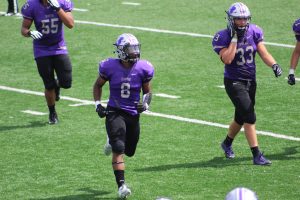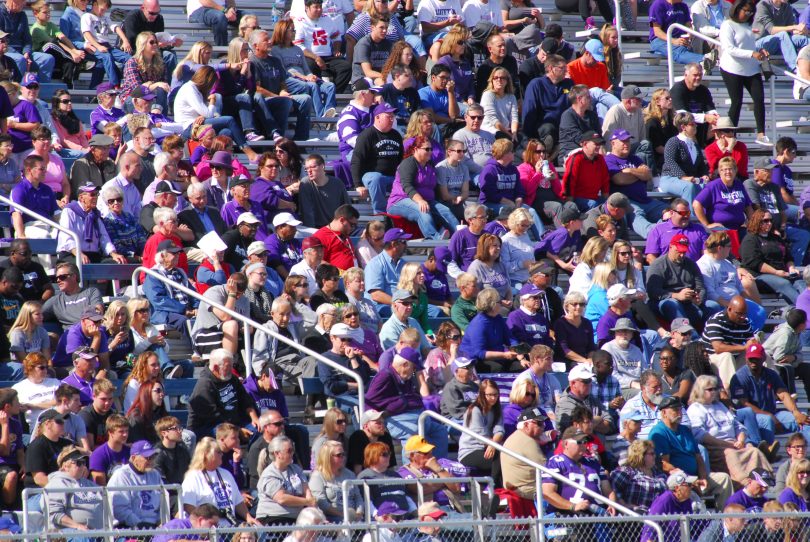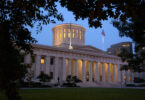A national debate began in 2016 when former San Francisco 49ers quarterback Colin Kaepernick knelt during the National Anthem to protest racial injustice and police brutality. The conversation that has ensued surrounding the National Anthem, athletic events and what, exactly, constitutes respect has reached as far as the Bluffton campus and spurred pre-game protocol changes within Bluffton’s own Heartland Collegiate Athletic Conference.
On Aug. 30, a statement by Athletic Director Phill Talavinia was distributed in the faculty and staff version of the Community Connection newsletter. Titled, “HCAC Statement on the Playing of the National Anthem before football games,” it provided information about shifts in pre-game protocol since last season.
At the end of last year, the HCAC Council of Presidents removed a bylaw requiring football teams to be on the field during the playing of the National Anthem. Football is the only sport in which the conference outlines specific pre-game protocols for the National Anthem. The HCAC did not respond to requests for an interview for this piece.
In April, the presidents further changed pre-game protocol so teams would not enter the field until after the National Anthem played. Talavinia’s Aug. 30 announcement said the decision came after incidents last season when football players from other conference schools knelt or did not appear on the field during the Anthem.

Malik Jackson, photo by Lexi Sponseller
One such incident occurred last November when Defiance College’s football team did not appear for the National Anthem during their game against Bluffton. Team captain Malik Jackson said the incident made some people upset and sparked “a lot of controversy.”
Talavinia said Defiance’s “violation of conference policy” led to public conversations on their campus involving their student athletes, administration, alumni and community.
Talavinia’s announcement cited student athlete safety as the top priority in the decision to keep teams off the field during the National Anthem.
“If we tell the teams they can’t be out there, then there’s no potential scuttlebutt over kneeling or not,” said Bluffton head coach Aaron Krepps as to why he feels the initial decision was made. Krepps took over as head coach earlier this year after official conversations on the protocol had already taken place.

Aaron Krepps, photo by Tyler Avila
Talavinia said as football season approached and discussions on the matter persisted, HCAC presidents decided to reverse the April decision and return to the original protocol, indicating teams are expected to be present on the field for the entire pre-game ritual.
Now in his 34th year as athletic director, Talavinia said HCAC protocols on the playing of the National Anthem are back to functioning the same way they have for roughly the past 10 years.
He said the only change is the addition of a statement to be read before the National Anthem at all HCAC football games. Included in Talavinia’s Aug. 30 announcement to faculty and staff, the statement emphasizes the importance of respect and explains the function of playing the National Anthem as a “tradition that shows respect for those who have served to protect our nation and the rights to liberty and freedom that we enjoy.”
Robin Bowlus, senior director of advancement operations and public relations, said the statement “aligns very well” with Bluffton’s values and affiliation with Mennonite Church USA.
Bowlus said the move to write a statement to be read before the playing of the National Anthem was a “collective” process and agreement between member schools, and a decision with which Bluffton will comply.
Information on the protocol shifts and the addition of the new statement on the National Anthem was not distributed in the student version of the Community Connection newsletter.
“There was no negative intent to keep it away from students,” said Talavinia. “There was no maliciousness.”
With the season underway, Krepps said he feels his team has not been impacted by changes to protocol in any way.
“I think media has made this a much bigger button or topic. It’s made it a one-sided story—or a one-or-the-other kind of story. It’s just crazy,” said Krepps.
He said he will fully support his team in the “realm of finding a way to make a difference,” but he’s also asked his team to consider what messages they’re trying to portray when they step out on the field.
“[The playing of the National Anthem] is a tradition that’s been happening in athletics, not just football, for many years. So if you want to make a statement, make sure that it’s one that we’re actually doing that has some type of significance,” said Krepps.
As a captain, Jackson said he does not feel the recent changes in protocol have made a big difference, but he believes in the importance of communication and openness between coaches and players.
“One hundred percent I think our coaches would support anything our players would do. It’s just we should present it to them first—don’t just catch them off guard,” said Jackson. “Say if we go and take a knee during the National Anthem, and faculty or staff say something to the coach, then our coach won’t know what to say if he wasn’t aware of it.”
Tyson Goings, director of multicultural student development and running backs coach, has been actively involved in facilitating discussions on the National Anthem with the football team as well as the Multicultural Student Organization since the issue first drew national media attention.
Goings said he believes in the potential Bluffton athletes have to make a “bigger impact in the classroom than on the sidelines on a Saturday.”
Goings spoke of ways football players and members of MSO have started working with Dr. Melissa Friesen, professor of theatre and communication, to use theatre for social change techniques to address controversial topics on Bluffton’s campus.
On such efforts, Jackson said it’s a chance to open the eyes of the Bluffton community and begin a dialogue that Bowlus said is a reminder of the football team “living out our Civic Engagement theme every day.”
“You can’t fix a national problem until you fix it at home,” said Jackson.







